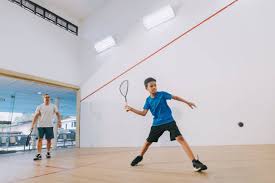For any young or junior Squash player returning back to school or starting university; it is important that education is a priority, as it can open many opportunities beyond the court.

Whether it be in the classroom or home-schooled, we stress that all our partners have a study program for their juniors to follow, along with mentoring to ensure they gain skills that can help in the future. Also, help them if they don’t make it as a Squash professional.
Junior squash athletes have a unique challenge to face – balancing their academic responsibilities with the demanding training and competition schedules that come with being a dedicated athlete.
So how can a young or junior Squash player manage both their education and playing Squash at the same time, well there are a number of ways of managing both that have no negative impact on both and can result in more opportunities.
Balancing act at school
Striking a harmonious balance between sports and studies is essential to ensure long-term success both on and off the court:
Create a Structured Schedule:
The key to successfully managing both academics and squash is to establish a well-structured schedule. Use a planner or digital tools to map out your weekly commitments, including training sessions, matches, and school hours. Allocate specific time blocks for studying and stick to them religiously. This structured approach will help you maintain focus and avoid procrastination.
Prioritize and Set Goals:
Identify your academic and athletic priorities. Recognize that there will be times when one takes precedence over the other. Set clear, achievable goals for both areas of your life.
This could improve your squash skills or aim for certain grades in school, having defined objectives will keep you motivated and on track.
Optimize Time Management:
Efficient time management is crucial for any junior squash athlete. Maximize productivity by utilizing small pockets of time between classes or during travels to review notes or complete quick assignments. Avoid wasting time on distractions like excessive social media use or video games. Use apps and tools to track your time and make necessary adjustments to optimize your productivity.
Communicate with Teachers and Coaches:
Open and honest communication is vital when balancing sports and studies. Make sure your teachers and coaches are aware of your commitments in both areas. Most teachers and coaches will be supportive and understanding, and they may be willing to offer extra assistance or flexibility when needed. However, it’s crucial to be responsible and maintain your commitments in both domains.
Utilize Study Groups and Teammates:
Team up with fellow students and squash teammates to create study groups. Collaborative learning can be effective and fun, and it allows you to cover more ground while offering support to each other. Additionally, sharing your squash journey with teammates can foster a supportive and motivating environment.
Create a Suitable Study Environment:
Designate a quiet and comfortable space for studying. Ensure it is well-lit and free from distractions. A proper study environment will enhance your focus and concentration, leading to more efficient study sessions.
Stay Organized:
Keep your study materials, squash gear, and school supplies organized. This habit will save you time and reduce stress, allowing you to transition smoothly between your academic and athletic commitments.
Learn to Manage Stress:
Balancing academics and athletics can be challenging, and stress may arise from time to time. Incorporate stress-relief techniques such as mindfulness, meditation, or physical activities outside of squash to maintain a healthy mental state.
Making the move in higher education
Progressing from junior squash to becoming a senior squash professional while pursuing a university education requires dedication, time management, and strategic planning. It’s undoubtedly challenging, but with the right approach and mindset, it’s achievable. Here’s a roadmap to help you navigate this journey:
Choose the Right University:
Select a university that supports both your academic and athletic ambitions. Look for institutions with a strong squash program or proximity to good squash facilities. Some universities have flexible academic programs that accommodate athletes’ schedules.
Participate in your university’s squash team and compete in intercollegiate leagues. This will help you stay in touch with competitive squash while at university and provide opportunities to network with other players and coaches.
There are a number of universities that have Squash Clubs, which play competitively, as well as a great social scene. Also consider entering local, regional, and national squash tournaments during university breaks or weekends. Tournament play is crucial to gaining exposure, experience, and rankings.
If you are studying in London, UCL Squash Club are one the most successful university Squash teams in the UK.
Prioritize Education:
While pursuing a career in squash is essential, remember that education is equally vital. Maintain a focus on your studies and prioritize your academics. This may involve planning your squash commitments around your class schedule and setting aside dedicated study time.
Seek Coaching and Training:
Continue working with a qualified squash coach who can help you refine your skills and identify areas for improvement. Utilize university resources or local clubs to maintain consistent training sessions.
Stay Fit and Injury-Free:
Take care of your physical and mental health. Regularly engage in fitness routines, injury prevention exercises, and maintain a balanced diet. Avoid burnout by balancing your training intensity with proper rest and recovery.
Network and Gain Exposure:
Use your time at university to network with fellow squash players, coaches, and professionals in the industry. Attend squash events, workshops, and conferences to expand your connections.
Seek Sponsorship or Scholarships:
Like most athletes, having financial support is often vital for pursuing a career in professional squash. Look for sponsorships or scholarships that may be available to student-athletes to help with training and travel expenses.
Final Thoughts
Taking on board all these tips, it is vital to stay positive and persistent, when it comes to your studies and Squash career.
Making the progression from junior to senior squash pro is a journey that requires perseverance. Stay positive, learn from setbacks, and remain dedicated to your goals.
Being a junior squash athlete comes with numerous challenges, but managing your studies while pursuing your passion for the sport is achievable with the right approach. By creating a well-structured schedule, setting clear goals, and communicating effectively with teachers and coaches, you can strike a balance that allows you to excel both on the court and in the classroom.
Remember that dedication, discipline, and time management are the keys to succeeding in both academics and squash and with perseverance, you can thrive in both areas of your life.
To sum up, becoming a professional squash player while in university will require sacrifices and disciplined time management. Balancing academics and sports at this level can be demanding, but it’s not impossible. By staying focused, disciplined, and making the most of available resources, you can work towards achieving success both on the squash court and in your academic pursuits.





